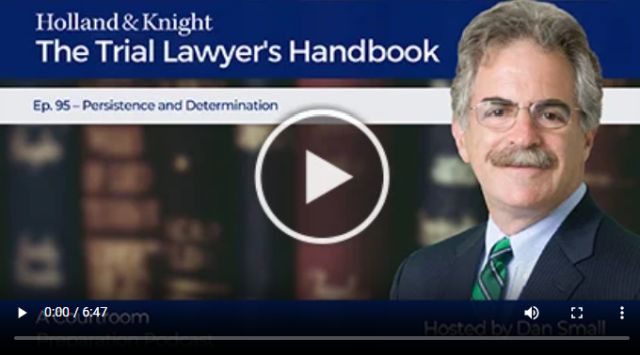- within Criminal Law topic(s)
- in United States
- within Criminal Law topic(s)
- in United States
In this episode of "The Trial Lawyer's Handbook" podcast series, litigation attorney Dan Small discusses the evolution of the Racketeer Influenced and Corrupt Organizations (RICO) statute. As a young lawyer with the U.S. Department of Justice's (DOJ) Organized Crime and Racketeering Strike Force, Mr. Small reviewed proposed RICO cases, including one against law enforcement officers in Appling County, Georgia, accused of participating in an illegal drug smuggling operation. The indictment faced several hurdles in getting approved, including pushback from higher-ups who believed that RICO was specifically meant for cases involving the Mafia. With help from a U.S. Attorney and FBI Special Agent Bill Hinshaw, the case was eventually approved. Later, at trial, they initially faced skepticism from the judge, but clear and compelling evidence led to a maximum sentence and helped reinforce the statute's reach beyond traditional organized crime.
Listen to more episodes of The Trial Lawyer's Handbook here.
This podcast episode was adapted from Mr. Small's book Lessons Learned from a Life on Trial: Landmark Cases from a Veteran Litigator and What They Can Teach Trial Lawyers.
Podcast Transcript
Dan Small: The Racketeer Influenced and Corrupt Organizations statute, also known as RICO, was passed in 1970, largely as a tool against the Italian Mafia. The idea was to address the mob's infiltration of legitimate businesses by showing a pattern of activity, instead of focusing on a single crime. However, Congress can't pass a law just for the Italian mob. It would be too specific, or too discriminatory, depending on your point of view. So the law makes no mention of the mob and is written generically. For the first years of its existence, defendants challenged the use of RICO against any group other than the mob as being beyond Congress' intent. But the court said no: The fight against the Mafia might have been the motivation for the law, but that's not what Congress wrote and passed.
The Department of Justice (DOJ) in Washington (D.C.) was concerned that the law's broad reach might tempt some prosecutors to abuse it, and the court might react by striking down or limiting this important new tool. So the DOJ required that all federal criminal RICO cases nationwide be reviewed and approved in Washington. As a new lawyer at the Department of Justice, when I joined the Organized Crime and Racketeering Strike Force, reviewing proposed RICO cases became part of my job. Sometimes, as with the Appling County case we've discussed in prior episodes, that included getting on a plane and assisting in the investigation, development and trial of RICO cases.
But it was still early in the law's evolution, and there were still hurdles along the way. The first hurdle was internal. After a great deal of work with the U.S. Attorney's Office, the FBI and the IRS, we drafted a proposed RICO indictment and supporting prosecution memo, and I brought it back to Washington with my recommendation that it be approved as soon as possible. But even though the law was broadly written, some still viewed it narrowly. The chief of the Department of Justice Criminal Division at the time was Rudy Giuliani, and he would not approve the indictment. In his view, this wasn't what RICO was meant for.
Not to be deterred, the United States Attorney and the Special Agent in charge of the FBI in Savannah, the great Bill Hinshaw, flew up to Washington to plead their case. They came to my office and we went to meet with Giuliani. He told us that RICO was for mobsters in New York, not corrupt sheriffs in Georgia. The U.S. Attorney was furious and responded that corrupt sherifs were a very serious issue. He wanted to be sure that he had heard Giuliani correctly, he said, because he intended to take this up with the Attorney General. We left the meeting with the issue unresolved. However, by the time we returned to my office to plot our next move, there was a message: The indictment had been approved up the line.
But the second hurdle was in court. The judge, like most judges around the country at the time, had never seen a RICO indictment, and he didn't like what he saw: too broad, too vague. Individual crimes should be prosecuted individually, not as some "pattern." Reviewing a series of defense motions attacking the law and the indictment, he made clear his displeasure: cutting back some of the charges, narrowing and limiting our case for trial and indicating that he might well do more. We were hanging on by our fingernails, but we got to trial.
Once there, we had strong evidence to present: testimony, dramatic tape recordings and exhibits. Evidence of southern Georgia law enforcement officers accepting bribes to promote drug smuggling. This might have been old news in Miami at the time, but it was new and profoundly shocking in rural Georgia.
Slowly but surely we could sense the judge's view of the case changing. The tape recordings were clear and powerful. The level of corruption was deeply disturbing. The defense clung to the sympathetic ear they had pre-trial, but that ear had turned from sympathy to anger, and the defense hadn't noticed. One of the most important skills for any trial lawyer is reading the room, and they weren't listening carefully enough to do that. At the close of the government's case, they moved for a directed verdict with great hopes — motion denied.
At sentencing, they presented the court with a huge notebook, as I recall, filled with hundreds of letters of support, particularly for the former sheriff, Red Carter, who had ruled that county for 20 years and had plenty of favors to call in. But the judge's shock at what he had heard was now clear. I don't have a transcript, but basically the same judge who had come so close to throwing our case out, now angrily declared:
"This will not happen in my Georgia! Sheriff, I've read all these letters, but the letter writers did not hear the evidence. I did. And I don't have a good word to say about you except you're lucky the government didn't charge you with more, so I can't sentence you to more."
And then gave him the maximum.
We did not decide to use this new law lightly. We knew it would present hurdles, but we also knew that we were dealing with a broad criminal enterprise that required us to be creative and aggressive in order to present the judge and jury with the full picture. RICO gave us that opportunity.
Being a trial lawyer requires you to make that match between the law and the facts. Sometimes that's easy. Sometimes, like here, it requires persistence and determination. If you've thought it through carefully and believe in your case, sometimes you can prevail.
The content of this article is intended to provide a general guide to the subject matter. Specialist advice should be sought about your specific circumstances.


